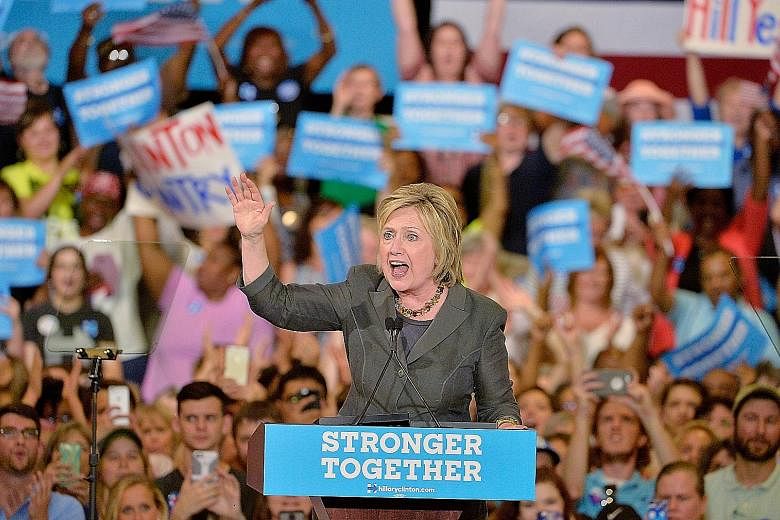WASHINGTON • For Hillary Clinton, Britain's emotionally charged uprising against the European Union is the sort of populist victory over establishment politics that she fears in the coming presidential election.
She shares more with the defeated "Remain" campaign than just their common slogan, "Stronger Together". Her fundamental argument, much akin to Prime Minister David Cameron's against British withdrawal from the EU, is that Americans should value stability and incremental change over the risks entailed in radical change and the possibility of chaos if Republican rival Donald Trump wins the presidency.
Mrs Clinton offers reasonableness instead of resentment, urging voters to see the big picture and promising to manage economic and immigration upheaval, just as Mr Cameron did. She, too, is a pragmatic internationalist battling against nationalist anger, cautioning that the turmoil after the Brexit vote underscores a need for "calm, steady, experienced leadership in the White House". But prudence is cold comfort to people fed up with more of the same.
According to friends and advisers, Mrs Clinton and former president Bill Clinton have worried for months that she is out of sync with the mood of the electorate, and that her politically safe messages - like "I'm a progressive who gets results" - are far less compelling to frustrated voters than the "political revolution" of Senator Bernie Sanders or Mr Trump's grievance-driven promise to "Make America Great Again". The two won a combined 25 million votes during the primary season; she garnered 16 million. Many Sanders supporters are expected to back her in November, but she has not recalibrated her message to try to tap the anger he and Mr Trump channelled.
Nor does she have plans, advisers say, to take cues from the Brexit campaign and start soft-pedalling her support for globalised markets or denouncing porous borders, illegal immigrants and the lack of job protection in free-trade agreements.
Much distinguishes the presidential contest from the British fight, of course, including a head-to-head match-up between well-known candidates, a sharply different economic context, and a long and proud history of immigration.
Yet, in addition to worrying that she is out of step, Mrs Clinton is somewhat hemmed in by her record: She supported her husband's North American Free Trade Agreement, which later caused significant economic pain in the industrial Midwest. And her nuanced views about free trade are a harder sell to many voters than Mr Trump's fiery vows to trash bad trade deals and use tariffs as economic weapons of national defence.
While she is counting on Mr Trump's history of racist and sexist remarks to doom his candidacy, the Brexit referendum was an unnerving reminder that voter anger is deeper and broader than many elite politicians and veteran pollsters realise. In swing states such as Ohio, many Democrats and Republicans yearn for an economic comeback and are not confident that Mrs Clinton understands their frustrations or has the ideas and wherewithal to deliver the sort of change they want.
"Brexit is clearly a cautionary tale for the Clinton campaign not to get too complacent about a potential victory," said Professor David Cohen, who teaches political science at the University of Akron.
Republican strategist Mike DuHaime said the British vote was the clearest sign yet that "the intensity against the status quo is far more real than many are still willing to acknowledge".
"If the Trump victory in the primary wasn't enough of one, the Brexit vote serves as a major wake-up call indicating just how frustrated average voters are with those in power," Mr DuHaime said.
Several Democrats cautioned against drawing too many lessons from the Brexit vote, saying mass immigration and economic malaise were bigger problems in Britain and the EU than in the United States.
Mrs Clinton's advisers said they were confident that the referendum in Britain did not mirror the presidential election in the US.
"These are two different countries, with very different circumstances and demographics, facing different choices," said Ms Jennifer Palmieri, Mrs Clinton's communications director.
NEW YORK TIMES

